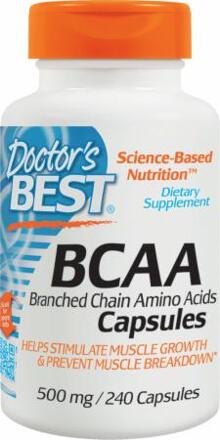| Serving Size: 1 Capsule | ||
| Servings Per Container: 240 Servings | ||
| Amount Per Serving | % DV * | |
| BCAA Blend | 500mg | † |
| L-Leucine | 250mg | † |
| L-Isoleucine | 125mg | † |
| L-Valine | 125mg | † |
|
* % Daily Value (DV) is based on a 2,000 calorie diet. Your daily values may be higher or lower based on your calorie needs.
† Daily Value (DV) not established. |
||
|
Other Ingredients: Modified Cellulose (Vegetarian Capsule), Microcrystalline Cellulose, Magnesium Stearate (Vegetable Source), Silicon Dioxide. |
||
|
Directions: Take 1 capsule, up to 3 times daily, before or after physical exercise, or as recommended by a nutritionally-informed physician. |
||
| Serving Size: 1 Scoop (5 grams) | ||
| Servings Per Container: 60 Servings | ||
| Amount Per Serving | % DV * | |
| L-Leucine | 2.5g | † |
| L-Isoleucine | 1.25g | † |
| L-Valine | 1.25g | † |
|
* % Daily Value (DV) is based on a 2,000 calorie diet. Your daily values may be higher or lower based on your calorie needs.
† Daily Value (DV) not established. |
||
|
Other Ingredients: Soy Lecithin Contains Soy. |
||
|
Directions: Dissolve 1 scoop of powder in a small amount of water or juice. Add an additional 6-8 oz. of liquid, mix well, and drink before exercise. Repeat after exercise, or before bed, or as recommended by a nutritionally-informed physician. |
||
The primary mechanism through which BCAAs stimulate muscle growth is by activating the protein mTOR, mammalian Target of Rapamycin. The mTOR signaling pathway is responsible for cellular growth, and most importantly, muscle protein synthesis. Muscle protein synthesis stimulated by the mTOR protein enhances muscle recovery and hypertrophy. This muscle protein synthesis is stimulated by the presence of Leucine, independent of the presence of any other amino acids. This was shown in a study in which researchers fed 25 healthy males a complete balanced diet, inducing hyperaminoacidaemia, an excess of amino acids in the blood stream. Only half of the subjects were supplemented with Leucine in addition to their diets; muscle fractional synthesis rates were shown to be significantly higher in the group that received the additional Leucine. This demonstrated that supplementation of one of the Branch Chained Amino Acids, Leucine, improves muscle protein synthesis independent of the presence of other amino acids.*
Another major mechanism by which BCAAs can increase muscle mass is by attenuating muscle breakdown as a result of exercise. Muscle proteolysis, or breakdown, has been shown to be suppressed simply with BCAA supplementation, independent of any action by insulin. Serum BCAA levels can be depleted and BCAA catabolism can be increased as a result of intense exercise. The best way to combat the muscle breakdown, muscle fatigue, depletion of serum BCAAs and the delayed on-set muscle soreness from intense exercise is to supplement with BCAAs.*
BCAA supplementation has been shown to improve sports performance; these improvements in sports performance have been demonstrated with a variety of mechanisms over many studies measuring sports related variables. In 2007, researchers conducted a study in college males to see how BCAA supplementation affected markers of muscle damage, perceived exertion and leg strength following exercise, compared to either carbohydrate or placebo supplementation. Following the exercise, the group that received BCAA supplementation showed lower levels in both of the measured markers of muscle damage, a lower rate of perceived exertion and better performance on the strength test compared to the groups that received either placebo or carbohydrate supplementation.*
In a study that examined two groups performing squat exercises over three days and received either carbohydrates or BCAAs, at a dosage of 5.5 grams. The group that received the BCAA supplementation maintained their performance throughout the study better and had less muscle soreness than the group that received the carbohydrate supplementation. In a study comparing elite competitive wrestlers on a hypo caloric diet, the group that received BCAAs, were able to maintain their high level of performance while inducing significant loss of body fat, as compared to groups receiving either high or low amounts of protein and the control group.*
Endurance performance was significantly improved in runners that received BCAA supplementation when trained participants competed in a 30-km cross-country race or a marathon. The runners that received BCAAs had more significant improvements in run times and less mental fatigue after the races compared to the placebo groups. Drinking BCAAs has been shown to enhance exercise capacity and increase lipid oxidation in individuals that have depleted muscle glycogen stores as a result of exhaustive exercise.
Branch Chained Amino Acids are an essential part of a healthy diet. BCAA supplementation, in combination with exercise, has been shown to improve sports performance through a variety of mechanisms. BCAAs have also been shown to help in improving body composition. The recommended dosage for Doctor’s Best Branch Chained Amino Acids is 5 grams daily.*



